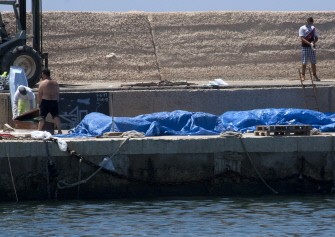Italian coast guards found 25 people choked to death in the engine room of a tiny boat fleeing Libya crammed with 271 African refugees that landed Monday on the holiday island of Lampedusa.
The 15-metre boat was heavily overcrowded and survivors said they had been at sea for three days. Prosecutors said the victims, crowded in a space accessible only through a trap door, appeared to have died from asphyxiation.

Refugees cited in Italian news reports said the people in the engine room had tried to get out but were blocked by others because there was not enough space on deck, and probably died of intoxication from the engine fumes.
"We will carry out an autopsy to find the precise cause of death even though initial checks show that it was apparently due to asphyxiation. Police will question the other refugees," local prosecutor Renato Di Natale told reporters.
Italy's secretary of state for immigration Sonia Viale expressed "deep pain" at seeing "once again, so many victims of human traffickers with no scruples" while the spokeswoman for the UN's refugee agency in Italy, Laura Boldrini, called for "light to be shed immediately on what happened".
Prosecutors opened an investigation into the deaths but have said they believe the refugees died in international waters as some of the corpses had already begun decomposing when they were pulled out by Lampedusa firemen.
"Given the state in which the corpses were found, they could have been dead for at least 48 hours," a local doctor, Pietro Bartolo, told reporters.
The corpses were laid out side by side in green body bags on a Lampedusa pier and then taken to the local morgue for autopsies.
The refugees did not initially mention the dead bodies and the grim discovery was made only when coast guards inspected the engine room below deck.
"Our team boarded the vessel for docking procedure at around 1:20 am (1120 GMT on Sunday)," Cosimo Nicastro, a spokesman for the coast guard, told AFP.
"There were 271 people on board including 36 women and 21 children and below deck unfortunately they also found 25 bodies of men," he said.
Coast guards said the engine room was only accessible through a 50-centimetre (20-inch) wide trap door from the deck.
A fireman who helped pull out the bodies from the boat said: "I will never forget the scene."
The charity Save the Children said the survivors were mainly from Ghana, Nigeria and Somalia.
"They are worn out and shocked by what happened," Tarek Brhane, a local representative of the charity, said in a statement.
"Among the dead are many of their friends and loved ones," he said.
Thousands of refugees fleeing Libya, mostly migrant workers from other parts of Africa, have arrived on Lampedusa in recent weeks. Hundreds have drowned, often on rickety fishing boats not suitable for choppy seas.
In April, some 250 refugees drowned off Lampedusa when their boat capsized.
"The Mediterranean should never become a symbol of death," said Raffaele Lombardo, the governor of Sicily, who condemned the "waves of migration."
Khalid Chaouki, a representative of the centre-left opposition Democratic Party, said: "There is an absence of any European effort to protect human life while the dramatic death toll in the Mediterranean continues to worsen."
Lampedusa, which has a surface area of just 20 square kilometres (7.7 square miles), is Italy's southernmost point and is closer to North Africa than to the Italian mainland.
It is now the biggest gateway for illegal immigration into the European Union following the arrival of tens of thousands from North Africa this year.
The almost daily arrivals of refugees from Libya and migrants from Tunisia seen in spring have slowed in recent weeks, with only occasional landings.
The last arrival on Lampedusa, of 231 people, was on July 17.
Scenes of desperation seen earlier this year have hit the pristine island's tourism industry but many holidaymakers have started returning to the beaches.
























